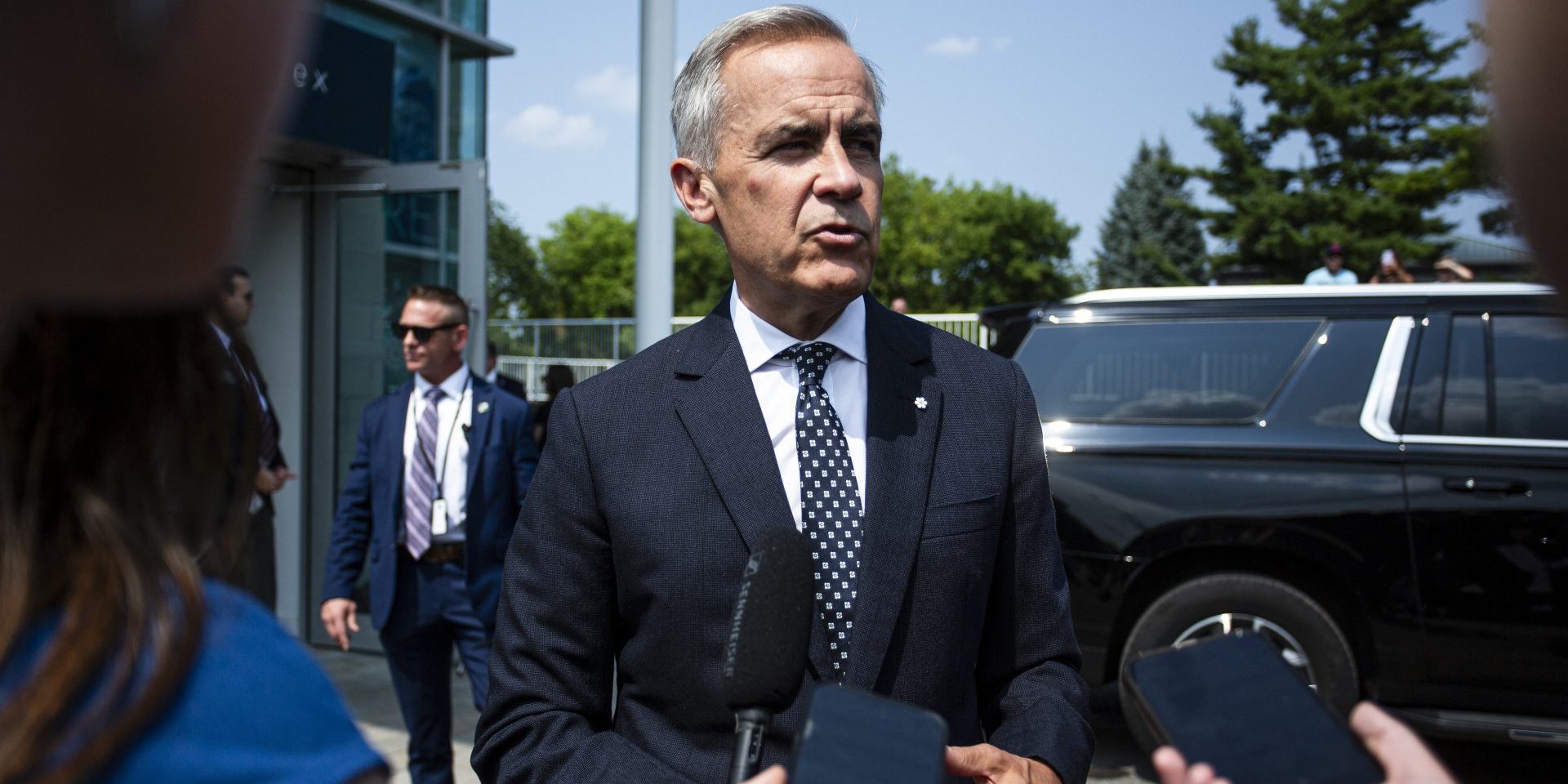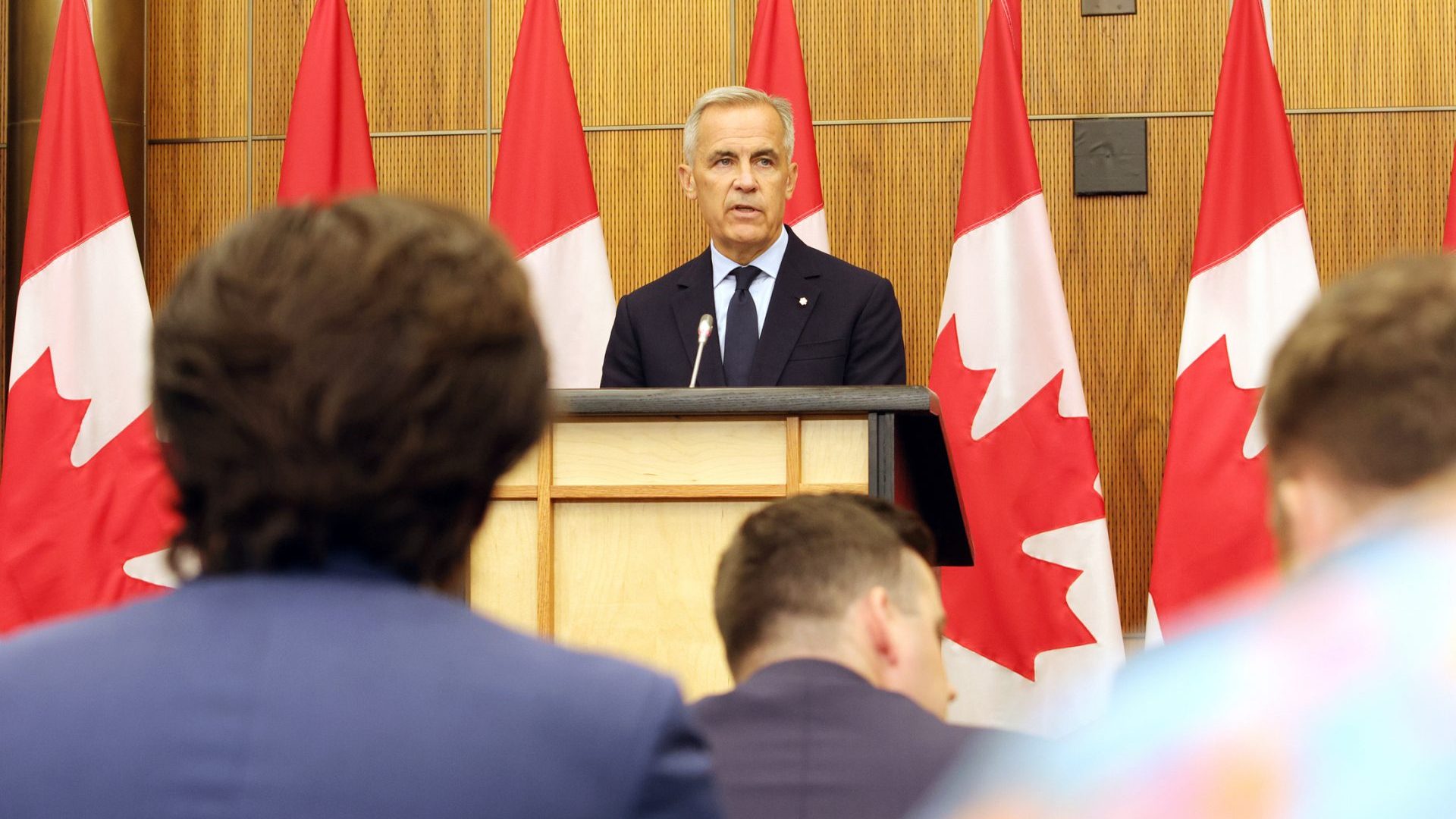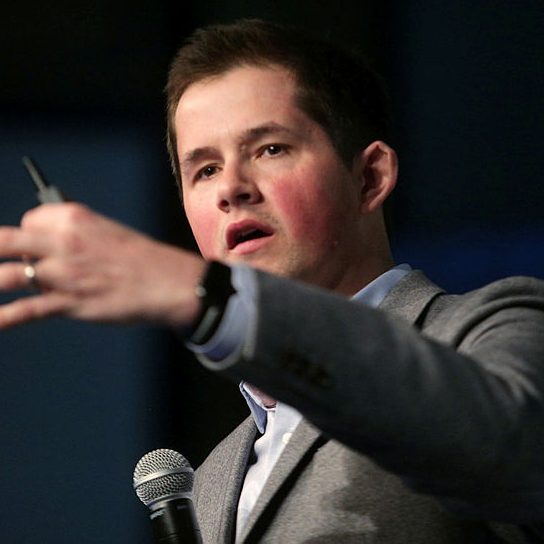Air Canada strike intervention shortens Carney’s domestic runway to land ‘Trump and trade’ deals, say strategists

Prime Minister Mark Carney is burning goodwill and accumulating a growing number of “self-inflicted wounds” domestically amid his “laser focus” on negotiations with the United States and efforts to strengthen Canada’s economy and military, say strategists.
And while his approval ratings among voters remain high, with Parliament soon to return from recess, strategists say his runway to provide results is nearing its end, and the longer it takes, the more those minor wounds threaten to become his “Achilles heel.”
NDP strategist Jordan Leichnitz told The Hill Times that no matter how important the “Trump and trade” file may be, Carney’s (Nepean, Ont.) unfamiliarity with the political considerations required of the job—whether on labour negotiations, First Nations reconciliation, or even caucus management—will become a greater and greater liability.

While Carney may have been elected on a mandate to negotiate with Trump, he can’t continue to dismiss and disregard anything that falls outside that narrow scope, said Leichnitz.
“Carney is the prime minister, so he needs to be responsible and responsive to all of these files—that’s why it’s a hard job,” said Leichnitz, a former deputy chief of staff to then-NDP leader Thomas Mulcair and current Canada program manager at the progressive German non-profit Friedrich-Ebert-Stiftung.
In a Substack post last week, Leichnitz wrote that Carney’s use of Sec. 107 of the Canada Labour Act to order Air Canada flight attendants back to work just hours after their strike began was his “first major error” since taking office, but conceded that—depending on perspective—it may not be his first, or his worst.
Since becoming prime minister last March, Carney’s economic and trade-focused priorities have been running afoul of the Liberal Party’s progressive wing, with criticisms raised over the lack of gender parity in his first pre-election cabinet lineup, his initial decision not to name a minister dedicated to women and gender equality, and the absence of a minister for labour, with only a minister for jobs and families named on March 14.
In his post-election cabinet, Carney restored gender parity, revived the women and gender portfolio under Minister Rechie Valdez (Mississauga–Streetsville, Ont.), and named first-time MP John Zerucelli (Etobicoke North, Ont.) as secretary of state for labour.
Carney has also been seen to have run afoul of several important Liberal Party constituencies over his handling of Beijing’s bounty on a Conservative candidate, Indian Prime Minister Narendra Modi’s invitation to this summer’s G7 summit, and Carney’s rushed implementation of Bill C-5, the One Canadian Economy Act, despite objections from Indigenous communities over a lack of consultation.
Leichnitz pointed to what she described as Carney’s “unfamiliarity” with the importance of stakeholder management as the cause. But she told The Hill Times that, unlike Carney’s previous errors, his Air Canada intervention was completely unforced and without any political benefit.
“The cardinal sin was that he put his government on the wrong side of that debate, and there was no need for it,” Leichnitz said, noting how quickly an agreement was reached once Air Canada realized it was the only way to get planes in the air again, despite the expected government intervention.

“A lot of his other errors you could argue were either visited upon him due to circumstances, or there was some political tradeoff that maybe I didn’t agree with, but they got something out of it,” Leichnitz explained. “But here, there was no win; there clearly wasn’t an impasse, and if they had just waited and done nothing, they could have avoided it entirely.”
Beyond those past errors, Leichnitz said there are also issues brewing on the horizon on more general domestic concerns like affordability, housing, and rising unemployment.
“On all of those things that Canadians are most worried about, this government does not seem to be making progress, and at a certain point, there will be political consequences for that,” she said. “Canadians’ patience may begin to run out.”
“Canadians have given Carney a lot of runway through the summer to make progress on the trade negotiations with the U.S., but the fall is going to be a different scenario,” said Leichnitz. She noted that Carney will also soon have to face Conservative Leader Pierre Poilievre (Battle River–Crowfoot, Alta.)—whose attention was divided this summer thanks to his byelection campaign—in the House of Commons.
However, Poilievre clearly isn’t waiting until the House returns on Sept. 15, as he jumped back in the saddle to criticize Carney in multiple press conferences held since his Aug. 18 byelection victory, capping off the week by suggesting Canada’s “elbows up” strategy has shifted.
“Carney’s elbows have mysteriously gone missing,” Poilievre told reporters on Aug. 22 following Carney’s announcement earlier in the day that Canada would be removing tariffs on Canada-U.S.-Mexico Agreement-compliant goods, except for aluminum, steel, and automotive parts.
“[Carney has] not thrown one elbow since he took office, except at our own workers,” Poilievre said.
“He has backed down while claiming that he would stand up, and he’s gotten absolutely nothing in return …[h]e promised he would have elbows up. He promised he could quote ‘handle Trump,’ and that he would quote ‘negotiate a win’. Those are his promises, and he needs to be judged by his word,” continued Poilievre.
Liberal strategist Joe Jordan told The Hill Times that while Carney has provided some opposition opportunities with a series of “self-inflicted wounds” domestically, he isn’t convinced the Air Canada intervention was one of them.
“I think most people would agree that the government couldn’t just do nothing and leave all those passengers stranded in the middle of the summer,” Jordan explained, adding that he also credits the expeditious settlement of the dispute to the union’s effective framing of their grievances around unpaid work.

However, beyond that example, Jordan said he thinks that what critics and opposition parties aren’t reckoning with is that Carney is not Justin Trudeau.
“There’s a new sheriff in town, and he won’t be distracted by any of the peripheral, shiny objects, or be Mr. Jolly in the House of Commons,” explained Jordan, a senior associate with Bluesky Strategy Group and a former parliamentary secretary to then-prime minister Jean Chrétien. “Carney’s government is laser focused on the objective of creating ‘the strongest economy in the G7.’ That goal drives everything else that it does, and anything that either doesn’t contribute directly or potentially impedes it is being viewed from that single–minded perspective.”
From that perspective, Jordan said many of the Trudeau government’s more progressive objectives will not receive the same attention they once enjoyed.
“When the budget is released in the fall, that’s when we will know what [Carney] views as the legitimate role of the federal government,” Jordan said. “And in these uncertain times—economically, and in terms of geopolitics—some of those ‘sunnier’ objectives are just not on.”
Ironically, however, while Jordan said that Carney’s government will resist distractions from the opposition or concerns about public opinion, he noted doing so was also seen to be the downfall of several of Carney’s predecessors, including Trudeau.
“Trudeau was also a politician who didn’t value political communications in the day-to-day; they had ceded that ground, and that became his Achilles heel. He completely lost the narrative,” Jordan said.
Jordan said Carney’s lack of expectation-tempering during the election hasn’t done him any favours on the narrative-control front, either.
“Carney is going to have to deliver something big, but he also can’t assume Canadians will get it and give him credit,” Jordan explained. “You can’t just tell them what you’re going to do. You have to tell them what you did, and tell them why it was important, and then do that about three more times.”
‘Thin line’ separates focus and consistency from arrogance, says Coletto
Abacus Data CEO David Coletto told The Hill Times that while Carney and his government’s approval rating remains high, all “honeymoons” eventually come to an end.
Coletto noted a “slight downtick” in Abacus’ most recent survey, with the Conservatives slightly ahead for the first time since before the election.

In its survey released on Aug. 24, the Conservatives edged out the lead with support from 41 per cent of decided voters, compared to the Liberals at 39 per cent, with the NDP and Bloc Québécois tied at seven per cent each.
Coletto said that, like Trudeau and many past prime ministers from both parties who enjoyed early periods of sustained popularity, sooner or later, even small mistakes begin to pile up and provide credence to their opponents’ criticisms.
Coletto said that Carney’s perceived competence and expertise is his strength among voters, but his weakest attribute is that voters don’t view him as understanding their experience.
“Carney isn’t viewed as naturally empathetic; voters don’t see that as his strength, but it is Poilievre’s,” Coletto said. “Carney has to be careful that the contrast doesn’t become too sharp.”
Coletto said, if not executed correctly, the main risk for Carney’s “mission-focused” determination to “drive change fast” is it being seen as rushed and poorly thought-out, particularly if he is seen as continually backtracking or conceding to Trump.
While ignoring political concerns may have been expected of a central bank governor when setting interest rates, as prime minister, Carney needs to recognize that his decisions and their outcomes are implicitly tied to stakeholder groups and public reaction, said Coletto.
He added that Carney’s decision to intervene in the Air Canada strike demonstrates that Carney has not entirely rid himself of old instincts, and that following it to the detriment of all other concerns has “made things worse, not better.”
“Keeping the peace is really important while at the same time moving things along, which is the huge challenge that he faces,” Coletto explained. “And there’s a thin line between voters seeing you as focused and consistent, and being seen as arrogant and stubborn.”
As of publication, 338Canada’s federal polling aggregation projected the Liberals with a 44 per cent polling average, followed by the Conservatives with 39 per cent, the NDP with eight per cent, and the Bloc at six per cent.
The Hill Times






 LICENSING
LICENSING PODCAST
PODCAST ALERTS
ALERTS













